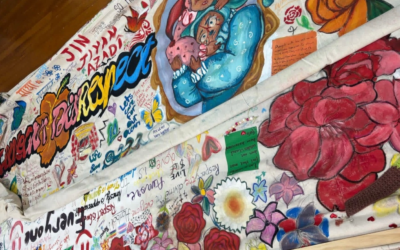Interview with director and writer Milena Bennett, by Luci Kugathasan and Nataša Aster-Stater
Milena Bennett’s 2023 short film, ‘Cactus’, is a heartbreakingly beautiful story about two lonely souls becoming unlikely friends. Through ‘Cactus’, Bennett tells her story using only a few simple details, an impressive feat for any director. Laughter, smiles, and tears of sadness and joy can be expected from watching ‘Cactus,’ which has a runtime of just under 20 minutes. On Friday the 30th of August, W’SUP interviewed Bennett to gain some behind-the-scenes insight about the creation of ‘Cactus’, and how Bennett honed her craft while writing and directing the film.
You directed, and co-wrote ‘Cactus’ along with Harry Greenwood – where did the idea for the story come from?
Milena Bennett: ‘It’s based on our real-life relationship with our old neighbour, Mr Rodrigues. So, we lived next door to him, in Marrickville, and we lived there for 5 years. Mr Rodrigues ended up going into a nursing home, but we lived next door to him for a few years. The film is based on that relationship – not everything is real, but a lot of it is.’

(The rose symbolises time, and friendship in ‘Cactus’ | Photo by Milena Bennett, 2023)
A few seconds into the film, there’s a close-up on the screen of a rose, clothed in a spider’s web. When gardening, Grace says “I love a weed” – as a viewer, I felt that represented both beauty in imperfection, and that nothing, no one, is just one thing. Was that a message you wanted to convey to the audience?
Milena Bennett: ‘I really like that that’s how you interpreted it. The use of the rose came in the editing process, so we had a day where we just went around Marrickville and took different shots – so I didn’t have a necessary intention at first. I was very drawn to it because it represents Marrickville – when you walk around Marrickville, particularly around old immigrant homes, there’s often not much going on but then there will be a single rose or a few rose bushes.
It just reminds me of that area a lot. That was why I was drawn to actually capturing it. I think a lot of the time when I am doing things, I don’t want to force symbolism on people, I want it to be open for interpretation. I think the rose, for me, mostly symbolised time, and the development of their friendship.’
The story shows the power of friendship, but also deals with loneliness and isolation – why were they important themes for you to explore?
Milena Bennett: ‘I think when we moved to Marrickville, it wasn’t gentrified yet. There wasn’t a cafe – there was Marrickville Markets and that was kind of it. We were surrounded by migrant families, and I just remember watching the neighbourhood change over time, like young families moving in, or young hipsters moving in, and just kind of wondering what that would be like for people who have been there their whole lives.
Mr Rodriguez had been there for thirty plus years, in the same house, and people had passed away around him. I think we wondered what it would be like for those people to see their neighbourhood change so much. I guess for those communities, when you’re watching it, you would have to be faced with things like loneliness and isolation when your neighbourhood’s very different, there’s different people coming in, it’s not what it used to be. So, we just wondered what that would be like.
Then, we actually wrote it [the script] …I don’t know what year we wrote it, but it was actually before COVID, and then after covid – all of us having experienced COVID and having that lack of community – we realised how important that was to all of us. During the pandemic, all you had was each other, whoever you were living with, and the people around you. So, for me, it became even more of an important story to tell.’

(The friendship between Grace and Mr Rodriques shows how our first impressions can be wrong | Photo by Milena Bennett, 2023)
The friendship between Grace and Mr. Rodrigues flourishes after they choose to reassess their first impressions of each other. Why do you think second chances are important in life, and with relationships?
Milena Bennett: ‘Because you can get something out of it. I think so often first impressions can form your judgements of a person, and you don’t actually really know them. I’m very, very guilty of that, and this experience, it forced me to question a lot of my judgements of other people, and the way that i go about things. I’m not perfect, but it’s just something i think about.
And I think that if you allow yourself to get to know people who are different to you, or to challenge you, sometimes – maybe not always – but you can actually… once you get past that, you realise well they’re just human like you. And you can get something out of it, which is a friendship, and I think that’s really nice.’
Being both director and writer, do you have to separate yourself from being a viewer when you’re on set and creating films, or do you put yourself in the audience’s seat?
Milena Bennett: ‘That’s an interesting question. I think about the audience more when I’m writing. I probably do on set as well, but more when I’m writing, because I don’t know how you could not think about the audience. I don’t necessarily base decisions solely on that – I still follow my instincts, but I do have worries…like I don’t want my audience to interpret the character as this type of person, or I don’t want them to think that this represents something when it actually doesn’t, so things like that are important to me.
But I also am a big fan of things being ambiguous, and people having to use their brains when they’re watching TV, or when watching a film – I don’t want to give them all the answers. But that is a constant kind of push and pull in my head, of what answers should I give them, and what shouldn’t I give them. I am thinking about the audience a lot, yeah.’

(“A hundred per cent, the character comes first for me with everything,” says Bennett. | Photo by Milena Bennett, 2023).
When you’re telling a story in 2 hours, the writer and director can take their time and reel the viewer in slowly – with short films, do you feel that every second counts? How do you know what to put on screen, and what scenes to cut?
Milena Bennett: ‘I guess in a way every second counts, but you kind of just find your way in the edit. I actually find the edit the most difficult part of the process, and the part that I like almost the least, because you get in a room and the editor’s done their first pass on it, and you’re like, “Oh my god, this is a complete disaster. And there’s so many things I need to fix.” And it really overwhelmed me.
And I also think communicating in that space is also really hard, because sometimes there’s so much you need to say and change, and you need to try things – a lot of it is about trying things, and then they don’t work. For me, I just want to try everything. And… the edit just kind of makes the decision for you, you just go, “Oh, that doesn’t work, let’s try something else.” So that’s how I make those decisions. But it can be a long process.’
When you get an idea for a story, does the plot come first, or the characters? And what does the creative process look like when it comes to planning and shooting a movie?
Milena Bennett: ‘A hundred per cent, character comes first for me with everything. For me, a film could be shot really badly, looking really tacky…but if it’s character-driven, and the story is good, it doesn’t matter. It’s always about character.
For me, I just read the script, over and over again – I end up just knowing it off by heart. And then I go through all the scenes and kind of analyse what’s actually going on behind everything. But I also…I’m someone who doesn’t like to overthink it, I like to find it on the day. So, I definitely prepare, and I want to know my characters, I want to know what’s going on, but I want to be open enough so that the actors can also find things in it that I haven’t found. So, if I overprepare, I overthink.
I’m not a huge fan of storyboarding, because again I feel that restricts my creativity rather than opens it – and that’s fine if other people like it, but again, I find it too planned out, and on the day I don’t feel free. I will make a shot list – a lot of directors of photography want shot lists, they like things to be planned out. So, I have to do things that I don’t want to do, but I’m just having to work with other people, so the shot lists are important for some people. And they’re probably good for me too – but again, on the day, you do what’s on the paper, but you also make it up as you go as well.
And I always want it to be like that – otherwise I just don’t understand how you can be creative. But some people I think really flourish in that kind of planned-out, strict box. But I just can’t work that way.’

(“The best thing to do is to make and create as much as you can.” | Photo by Milena Bennett, 2023).
What shows and films inspire you?
Milena Bennett: ‘Teenage shows – my number one TV show of all time is ‘Buffy the Vampire Slayer.’ I’ve watched it way too many times, and I feel like, as an adult, I see so many things in it that I didn’t see before, and it just…it doesn’t age. There’s so much in it, there’s so much going on, so that’s always inspiring. I do struggle with TV shows these days, there’s so many of them, and I think the way that we used to make television, where we had twenty-two, twenty-four episodes…you could really sink your teeth in it and get to know the characters.
Whereas with TV shows now, it’s like eight half-hour episodes, and I just can’t get to know people or care about them. So, I do struggle with TV these days.’
What advice would you give to people wanting to be involved in filmmaking?
Milena Bennett: ‘Don’t go to film school – unless it’s really good. Make sure you research where you go. Because institutions are not necessarily creative spaces. I would just make and create your own things, just keep doing that. There’s no one way to get into this industry – I, myself, am struggling to figure it out.
But all I can say is just to trust your instincts, and be who you are, because I feel a lot of people say, “Go out and network, and go out and do this”, and if that’s not something you’re comfortable with, don’t do it. Don’t just do what everyone tells you to do, just follow what feels right to you. And… I think the best thing to do is to make and create as much as you can – I know that’s hard because you need money, but people in this industry like doing favours for each other, so you can do things with not much.’
Follow Milena Bennett and ‘Cactus’ social page on Instagram:
https://www.instagram.com/cactus_shortfilm/



